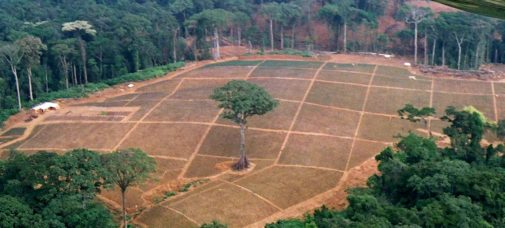 Tropical rainforests shrank by 6,500 square kilometers in March. Criminal groups are taking advantage of the pandemic and the unemployed are getting desperate, the WWF said. As the COVID-19 virus was spreading around the world, deforestation in the world's rainforests rose at an alarming rate, the German arm of the World Wildlife Fund (WWF) said in a o study published last week.
Tropical rainforests shrank by 6,500 square kilometers in March. Criminal groups are taking advantage of the pandemic and the unemployed are getting desperate, the WWF said. As the COVID-19 virus was spreading around the world, deforestation in the world's rainforests rose at an alarming rate, the German arm of the World Wildlife Fund (WWF) said in a o study published last week.
The study, which analyzed satellite data of 18 countries compiled by the University of Maryland, found that deforestation rose by 150% this March compared 2017-2019 average for the same calendar month.
Around 6,500 square kilometers (2,510 square miles) of rainforest were felled in March alone.
"This indicates that we're dealing with a coronavirus effect on the exploding rates of deforestation," Christoph Heinrich, the head of nature conservation with WWF Germany, said in a statement.
The forests most heavily hit by deforestation in March were in Indonesia, with more than 1,300 square kilometers lost.
The Democratic Republic of Congo saw the second-largest forest loss with 1,000 square kilometers followed by Brazil with 950 square kilometers.
The Brazilian non-profit research institute Imazon told news agency DPA that deforestation was up in April as well. The institute recorded a loss of 529 square kilometers in the Amazon in April, a rise of 171% compared to last year.
The WWF says there's ample evidence to suggest the boom in rainforest deforestation is being fueled by the COVID-19 pandemic.
With stay-at-home orders and strict lockdowns in place in countries around the world, authorities haven't been able to patrol nature preserves and indigenous territories as often — a situation that criminal organizations and illegal loggers have been using to their advantage.
The Democratic Republic of Congo saw the second-largest forest loss with 1,000 square kilometers followed by Brazil with 950 square kilometers.
The Brazilian non-profit research institute Imazon told news agency DPA that deforestation was up in April as well. The institute recorded a loss of 529 square kilometers in the Amazon in April, a rise of 171% compared to last year.
The WWF says there's ample evidence to suggest the boom in rainforest deforestation is being fueled by the COVID-19 pandemic.
With stay-at-home orders and strict lockdowns in place in countries around the world, authorities haven't been able to patrol nature preserves and indigenous territories as often — a situation that criminal organizations and illegal loggers have been using to their advantage.


